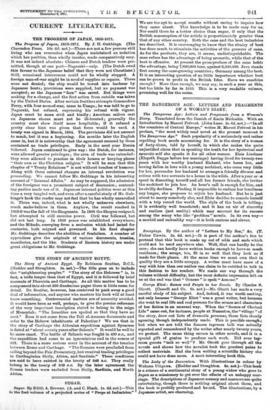CURRENT LITERA_TURE.
THE PROGRESS OF JAPAN, 1858-187L
The Progress of Japan, 1853-1871. By 3. Gubbings. (The Clarendon Press. 10s. 6d. net.)—There are not a few persons still living who can remember when Japan maintained an isolation which her position, then wholly insular, made comparatively easy. It was not indeed absolute: Chinese and Dutch traders were per- mitted, though at one port--Nagasaki—only. (The Dutch owed this favour to the Japanese belief that they were not Christians.) Still, occasional intercourse could not be wholly stopped. A foreign man-of-war might be in need of supplies or repairs. These were not denied; the ship would be towed into harbour by Japanese boats ; provisions were supplied, but no payment was accepted; so the Japanese "face" was saved. But things were making for a change, and the first action from outside was taken by the United States. After certain fruitless attempts Commodore Perry, with four men-of-war, came to lJnaga; he was told to go to Nagasaki, but refused, expressing his refusal with vigour. Japan must be more civil and kindly ; American sailors cast on Japanese shores must not be ill-treated; generally the country must show itself more hospitable ; if it refused a pretty clear hint was given that force would be used. A treaty was signed in March, 1854. The provisions did not amount to much, but it was a beginning. Six months later the English came in, but it is noteworthy that the agreement secured by them contained no trade privileges. Early in the next year Russia followed. Japan continued to give way : the Dutch, for instance, were allowed greater privileges ; the area of trade was extended: they were allowed to practise in their houses or burying places "their own or the Christian religion." It will be seen that this chapter of "Treaty Relations" is not without touches of humour. Along with these external changes an internal revolution was proceeding. We cannot follow Mr. Gubbings in his interesting account of " Internal Affairs." As may be supposed, the admission of the foreigner was a prominent subject of discussion; contend- ing parties made use of it. Japanese internal politics were at this time a very tangled web, and even after a careful study of Mr. Gub- binge's book the reader may not feel that he has wholly unravelled it. There was, indeed, what is not wholly unknown elsewhere, much make-believe in them. Anyhow, the result reached in 1868-9 was the fall of the Shogunate. In 1868 the Shogun resigned, 'but attempted to still exercise power. Civil war followed, but did not last long. In 1869 peace was established everywhere, and the Mikado, emerging from a seclusion which had lasted for centuries, both reigned and governed. In his final chapter Mr. Gubbings describes the abolition of feudalism. A number of appendices give the originals of various documents, treaties, manifestos, and the like. Students of Eastern history are under great obligations to Mr. Gubbings.


































































 Previous page
Previous page